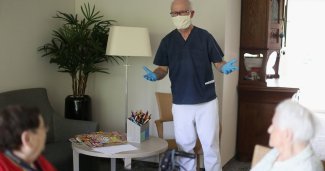

It won’t be news to anyone who has been paying attention but it bears repeating for those at the back: the quality and safety of the care our elderly and vulnerable receive cannot be decoupled from the conditions of care workers.
Personal protective equipment (PPE), safe staffing levels, clear protocols, training, access to testing, safe transport, sick pay for self-isolation; ask any care worker from day one of the pandemic and they would have identified most of these as tools they needed more of. The fact that a year on, so many of them are still not receiving this life-saving support is not just down to one-off bad management but is a testimony to the decades-long effort to erode their collective power.
Taking a closer look at cases in which Covid-19 outbreaks have had the most devastating effects, some clear patterns emerge. In Spain, where 70 per cent of nursing homes are privately owned, even a large chunk of the remaining publicly owned nursing homes are managed by private for-profit businesses.
In a badly hit nursing home during the second wave run by the Orpea Group, the victim’s families are taking the corporation to court. The families accuse Orpea of not providing adequate safety protocols and suggest “there has presumably been fraud in the application of the worker[-to-patient] ratio.”
Cutting workers out – a competitive advantage?
Orpea is the second largest for-profit nursing home corporation in Europe. While nursing home finances have been through a rocky patch, Orpea boasts some interesting figures. It has broken its record revenue levels for the fourth quarter of 2020 (the very period for which it is being brought to court by victims’ families in Spain for alleged understaffing). Meanwhile in Ireland, Orpea has just bought out half of another nursing home company, placing it as the second largest nursing home provider in the Republic.
The French-based group operates across many European countries. Rivalling its geographical coverage is its notoriety for undermining its workers’ collective bargaining rights at work.
In Germany, Orpea is being brought to court for sabotaging the work of employee representatives on the works council. With the trade union ver.di holding a vigil in support, the works council took legal action that could result in charges of a criminal offence.
There is suspicion, that beyond the case itself, the corporate strategy is about restraining workers and their representatives who speak up into legal disputes. As one legal analyst put it, in this strategy “the important thing is not that they [the cases] are won [by Orpea], but that people are worn down and give up”. A similar approach can be discerned in neighbouring Poland.
A broader trend
Orpea’s approach crystallises some of the broader trends that have emerged over the past few decades. The financialization of the care sector means that there is an increasing misalignment of purpose away from delivering quality care.
Instead, more focus is being placed on the management of ‘assets’ like the buildings which many nursing homes traditionally own. Here again, Orpea provides an insightful case study. It is currently undertaking a number of ‘sale-and-leaseback’ deals. In order to free up cash that it can then invest in more expansion or filter upwards via dividends, it sells off the buildings in which the nursing home is set up. The nursing home must then pay rent, making budgets ever-more precariously tight.
Often, these corporations have complex structures in which different legal entities criss-cross over multiple jurisdictions, some of which are conveniently located in tax-havens.
While the tactics vary, the results consistently leave workers with less of a say over a shrinking pie of resources dedicated to the essential task of caring for our elderly and vulnerable.
Corporations have benefitted from the no-hands steering approach of those in charge of regulation and enforcement, the consequences have hit home hard during this pandemic. Rather than be listened to, care workers have too often been left to face traumatising situations alone. The tragic death, of residents and of workers, is accompanied by post-traumatic stress for which we have no vaccine and which will need some caring itself.
What can be done?
Fixing care is about rebalancing the ways in which the decisions that shape it are made. Ensuring workers have a strong say is fundamental. Collective bargaining, which we know is so essential for the needs of workers to be met, has been hollowed out. Now is the time to strengthen it.
Across Europe, care workers and their unions are mounting some truly inspiring battles, exposing the foul play and gaining ground. At the height of the second wave in Poland, workers in one nursing home came together and won major gains, including PPE and safer staffing levels. Crucial to victories like this one has been the active support that care workers have received from the public. Care unions have also been working together across borders within UNI Europa to build a coordinated strategy towards common problems as well as within the same corporations.
Those who invest in these corporations can also play an important role in driving up standards across the sector. Pension funds, asset managers, sovereign wealth funds and other institutional investors who are committed to a socially sustainable world need to bring workers back into the fold and refocus these corporations on delivering care.
As well as private investment, public investment plays a determining role in shaping the care sector. Currently, policymakers are choosing to give the green light to corporations that cut their workers out. Instead, this lever must be activated to give workers a say by requiring collective bargaining wherever public money is invested.
The EU has a key role to play here. It can call on national governments to require that all public procurement be made conditional on workers having collective bargaining agreements. Going back to the broken system of care cannot be the answer. This crisis has exposed some nasty business, it’s time to clean it up.









